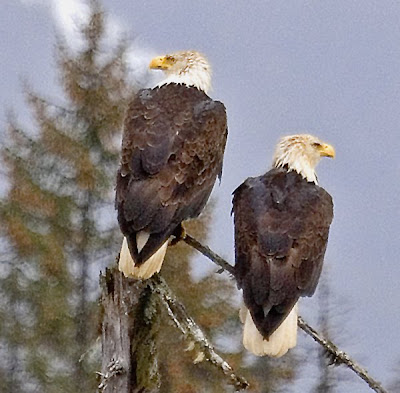News and links about birds, birding, and the environment
 Pairs of Australian magpie-larks sing together to ward off intruders. The most successful pairs had the most coordinated songs - in tune with each other and in the right tempo to sound like a single voice.
Pairs of Australian magpie-larks sing together to ward off intruders. The most successful pairs had the most coordinated songs - in tune with each other and in the right tempo to sound like a single voice.- The U.S. Fish and Wildlife Service has published new rules pertaining to bald and golden eagles in preparation for the probable de-listing of the bald eagle at the end of June. (Here are some reactions.)
- Red knots continued to decline over the past year. Counts around the Delaware Bay decreased from 15,000 last year to 12,300 this year.
- Over the next century, 900-1,800 species of birds will incur severe range loss due to climate change and land-cover alteration. One bird that may be lose substantial habitat is the white-crested hornbill.
 National Wildlife has an article on Galápagos finches and evolution. Natural selection has been observed working on medium ground finches on a short time scale.
National Wildlife has an article on Galápagos finches and evolution. Natural selection has been observed working on medium ground finches on a short time scale.- American Bird Conservancy is urging that rare new species not be collected as physical specimens.
- Rooks in the U.K. have been observed using fresh cigarette butts to kill feather parasites. (Thus proving the dangers of second-hand smoke?)
- A power plant in Minnesota is burning (farm) turkey waste from farms to generate electricity. There are lingering questions about the plant's efficiency and emissions, and whether the waste would be better used as fertilizer.

- Wild turkeys are on the loose in Detroit!
- Farmland birds in Europe have dropped by almost half in the past 25 years.
- Here is some praise for the USDA Conservation Reserve Program, which is credited with maintaining populations of grassland birds and waterfowl.
- The U.S. Fish and Wildlife Service wants Cape May, New Jersey, to stop maintaining feeding stations for feral cats since the cats are a hazard to endangered species nesting on the beaches.
- Virginia could lose half of its wetlands along the Atlantic Ocean and Chesapeake Bay over the next century due to sea-level rise.
- The G-8 leaders announced that they agreed to reductions in greenhouse gas emissions, but the extent of the agreement is unclear. (More from Grist)
- The distance that food travels needs to be a factor in weighing the environmental benefits of buying organic vs. conventional food.
- Salmonellosis has killed many birds at feeders in Washington State. The best way to prevent the spread of this disease is to clean feeders and birdbaths regularly with a mild bleach solution, and stop feeding temporarily if sick birds appear.
- BirdLife is looking for photographs of the 189 birds it designates as critically-endangered for a Rare Birds Yearbook (to be released in October).
- Via Negativa: Shooting Bambi
- Bell Tower Birding: Cooper's Hawk and the different ways of seeing it
- GrrlScientist: The Agonized Deaths of Dinosaurs Captured in Stone
- BES Group: Carolina Wrens nesting in a Washington, D.C. suburb
- Bill Thompson: Interview with Kenn Kaufman
- Aetiology: Environmental change and infectious disease
- Modeshift: Big Green’s Silent Spring For Rachel Carson — Take Two
- Friday Ark #142
- Tangled Bank #81
- News from the BirdLife Partnership, May 2007
- Birds in the News #86
- Circus of the Spineless #21
- Known North American Bird Blogs #6




